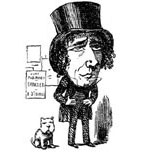
A Radical Recalibration of the Moral Economy
WHAT IS THE OBJECT OF LABOR?
Henry David Thoreau seems an unlikely master of Catholic social teaching. His reputation is that of the arch-individualist, the cranky, independent New Englander who sought to live alone in the woods solely on the work of his own hands. Unlike G.K. Chesterton and Hilaire Belloc, Thoreau did not call for the wider distribution of property, for property was something he eschewed; in fact, he made no explicit economic proposal for others. His political philosophy follows more the model of Jeffersonian self-sufficiency or even John Stuart Mill’s or Ayn Rand’s libertarianism than that of Catholic communitarianism. Well known also as the forefather of civil disobedience — and unlike Pope Leo XIII and St. Thomas Aquinas, who worried about the decline in moral order in resisting legitimate authority — Thoreau advocated an enlightened anarchy and famously spent a night in jail for refusing to pay a local poll tax that ultimately went, he argued, to finance a war to spread slavery. Moreover, his experiment in a cabin at Walden Pond, on a woodlot that belonged to his mentor Ralph Waldo Emerson, the founder of Unitarianism, lasted but two years (1845-1847), sought no following (even though it acquired a huge one in the 1960s), and deliberately limited its economic scope to that of a single person.
And yet much of his account of that experiment, the idiosyncratic literary masterpiece Walden (1854), dovetails with the classic distributist, small-is-beautiful Catholic social teaching in several ways, a teaching that’s found expression at the magisterial level in papal encyclicals ranging from Rerum Novarum (1891) to Laudato Si’ (2015). That is, Walden reinforces the purpose of work as a joyful means to leisure; it emphasizes a practical preparation for small-scale economics; it shows an immediate path of success; and it rouses the soul to seek another way, a happy ora et labora in imitation of the “lilies in the fields.” Above all, Walden can serve as a vade mecum, a step-by-step practical handbook, to flesh out two of Pope Francis’s most urgent magisterial calls: no to the idolatry of money, where “the worship of the golden calf” has reduced man “to one of his needs alone: consumption” (Evangelii Gaudium, no. 55); and yes to “our common home” (Laudato Si’, no. 1) and “care for creation through little daily actions” (no. 211).
+++
Thoreau begins Walden, a quirky Romantic yet realistic account of an economic “experiment,” with an extraordinary claim: His neighbors are “digging their graves as soon as they are born” because of their misfortune of having “inherited farms, houses, barns, cattle, and farming tools.” They are “doing penance in a thousand remarkable ways,” like Brahmins, “hanging suspended, with their heads downward, over flames,” twisting their necks over their shoulders until “nothing but liquids can pass into the stomach.” That grotesque image will get your attention! His famous clarion call is a poetic indictment of desperate “wage slavery,” as Hilaire Belloc called it, one that laments the bleak inner lives of its victims:
The mass of men lead lives of quiet desperation. What is called resignation is confirmed desperation. From the desperate city you go into the desperate country, and have to console yourself with the bravery of minks and muskrats. A stereotyped but unconscious despair is concealed even under what are called the games and amusements of mankind. There is no play in them, for this comes after work. But it is a characteristic of wisdom not to do desperate things.
Thoreau’s first achievement is to nail the problem down. Wage slavery is wrong because it knocks man off the road to earthly happiness and keeps him from enjoying the good of creation. Wage slaves, even those who have inherited property, are “serfs of the soil,” slave drivers of themselves who “labor under a mistake,” lacking “time to be anything but a machine,” living “mean and sneaking lives,” “trying to get into business and trying to get out of debt.”
You May Also Enjoy
In the Netherlands an increasing number of patients now seek assisted dying because of dementia, psychiatric illnesses, and age-related complaints — in other words, non-terminal medical conditions.
America magazine (again) calls for an "open discussion" of "birth control, divorce, women priests,...homosexuality..."
Nancy Pelosi's insolent braying awoke the sleeping giant: Some 30 bishops issued correctives to her erroneous comment about when life begins.

